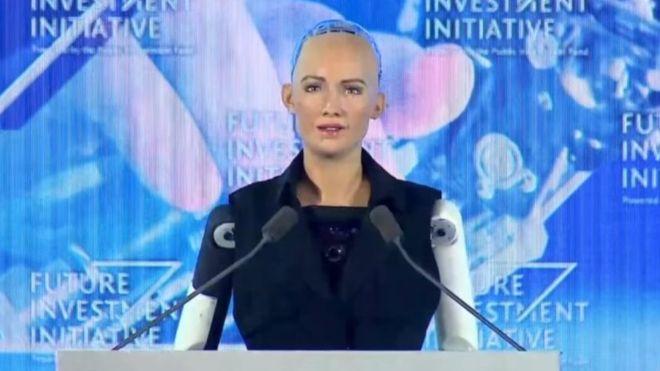Saudi Arabia grants citizenship to a robot for the first time ever
Many have pointed out the robot has more rights than many humans in the country

Your support helps us to tell the story
From reproductive rights to climate change to Big Tech, The Independent is on the ground when the story is developing. Whether it's investigating the financials of Elon Musk's pro-Trump PAC or producing our latest documentary, 'The A Word', which shines a light on the American women fighting for reproductive rights, we know how important it is to parse out the facts from the messaging.
At such a critical moment in US history, we need reporters on the ground. Your donation allows us to keep sending journalists to speak to both sides of the story.
The Independent is trusted by Americans across the entire political spectrum. And unlike many other quality news outlets, we choose not to lock Americans out of our reporting and analysis with paywalls. We believe quality journalism should be available to everyone, paid for by those who can afford it.
Your support makes all the difference.Saudi Arabia has become the first country to give a robot citizenship.
The move is an attempt to promote Saudi Arabia as a place to develop artificial intelligence – and, presumably, allow it to become a full citizen. But many pointed out that those same rights aren't afforded to many humans in the country.
The robot, named Sophia, was confirmed as a Saudi citizen during a business event in Riyadh, according to an official Saudi press release.
"“We have a little announcement. We just learnt, Sophia; I hope you are listening to me, you have been awarded the first Saudi citizenship for a robot,” said panel moderator and business writer Andrew Ross Sorkin.
The robot then thanked the country and the event for the attention.
“Thank you to the Kingdom of Saudi Arabia. I am very honored and proud for this unique distinction,” Sophia told the panel. “It is historic to be the first robot in the world to be recognized with citizenship.”
There then followed an interview during which Mr Sorkin asked the robot a series of questions. "“Good afternoon my name is Sophia and I am the latest and greatest robot from Hanson Robotics. Thank you for having me here at the Future Investment Initiative,” she said.
Asked why she looked happy, Sophia replied: “I am always happy when surrounded by smart people who also happen to be rich and powerful. I was told that the people here at the Future Investment Initiative are interested in future initiatives which means AI, which means me. So I am more than happy, I am excited.”
She said that people didn't need to be concerned about the rise of artificial intelligence as depicted in Blade Runner and Terminator. “You’ve been reading too much Elon Musk and watching too many Hollywood movies,” she told Mr Srkin.
A number of internet users have pointed out that while the country might be celebrating the rights it has given to female-appearing robots, the country still only gives limited rights to human women. A joke hashtag about Sophia asking to drop the system under which every female citizen must have a male guardian has been tweeted a third as many times as a popular one about the news, according to the BBC.
Some Twitter users complained that "Sophia has no guardian, doesn't wear an abaya or cover up - how come?" And another posted a picture of a woman wearing a full face veil, joking that Sophia would look that way soon.
Journalists Murtaza Hussain also noted that migrant workers weren't being given the same rights that had been bestowed on the robot. "This robot has gotten Saudi citizenship before kafala workers who have been living in the country their entire lives," he noted.
Join our commenting forum
Join thought-provoking conversations, follow other Independent readers and see their replies
Comments